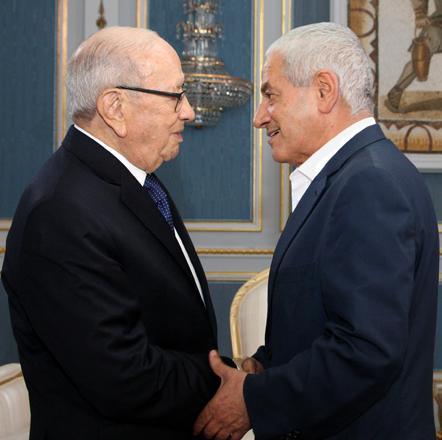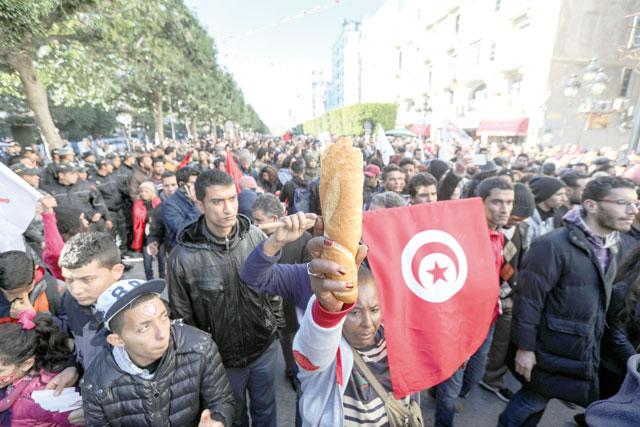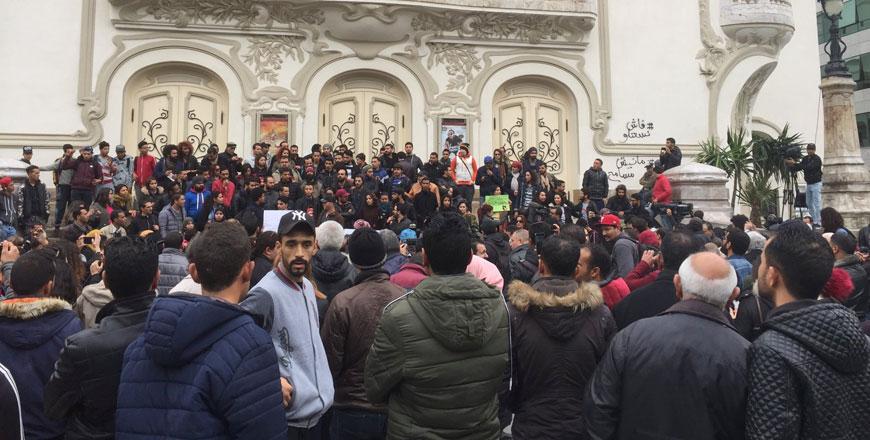You are here
Tunisian president meets unions, employers after unrest
By AFP - Jan 13,2018 - Last updated at Jan 13,2018
TUNIS — Tunisian President Beji Caid Essebsi held talks Saturday with political parties, unions and employers to discuss means to overcome a week of unrest triggered by austerity measures.
The North African country has been shaken by a wave of protests over poverty and unemployment during which hundreds have been arrested before the unrest tapered off.
The two-hour crisis meeting at the presidential palace brought together Essebsi, representatives of political parties, the powerful UGTT trade union and the UTICA employers federation.
"We discussed the general situation in the country and the reforms, especially socioeconomic, that must be adopted to overcome the current problems," UTICA head Wided Bouchamaoui told reporters.
Although no concrete decisions were announced, Noureddine Taboubi, the secretary general of UGTT, said measures "must be adopted" to aid needy families and boost social care in the North African state.
Proposals were raised "to pull out of this tension" without scrapping a contested 2018 budget, said Rached Ghannouchi, head of the Islamist movement Ennahdha in Tunisia's ruling coalition, without elaborating.
UTICA and UGTT shared the 2015 Nobel Peace Prize for their work during Tunisia’s transition towards democracy after the revolution.
The demonstrations broke out ahead of Sunday’s seventh anniversary of the toppling of veteran dictator Zine El Abidine Ben Ali in a revolt that sparked uprisings across the Arab region.
The trigger of the protests on January 7 was the budget imposing tax hikes after a year of rising prices.
A man in his 40s died in unrest on Monday night in the northern town of Tebourba though police have insisted they did not kill him.
Interior ministry spokesman Khlifa Chibani on Saturday said a total of 803 people suspected of taking part in acts of violence, theft and looting have been arrested this week.
Some 97 security forces and members of civil protection units were also injured, he said. There was no immediate toll for the number of protesters injured in the unrest.
Calm returned to the country on Thursday night and there was “no attack against public or private property” in the night of Friday to Saturday, Chibani said.
AFP correspondents reported one small protest overnight Friday in the central city of Sidi Bouzid — the cradle of the 2011 Arab Spring uprising — and said police fired tear gas to disperse the demonstrators.
Tunisia is considered a rare success story of the Arab Spring uprisings that began in the North African country in 2011 and spread across the region, toppling autocrats.
But the authorities have failed to resolve the issues of poverty and unemployment.
Protests are common in Tunisia in January when people mark the anniversary of the revolution that ousted Ben Ali.
This year, the country has seen rising anger after the government adopted the 2018 budget which includes hikes in value-added tax, on mobile phones and real estate as well as in social contributions.
Related Articles
TUNIS — Tunisia's powerful UGTT union, a joint winner of last year's Nobel Peace Prize, on Friday rejected a call from the country's preside
TUNIS — Tunisians on Sunday marked seven years since the uprising that launched the Arab Spring, with fresh protests and some people express
TUNIS — A third night of unrest has shaken Tunisia where authorities said Thursday more than 600 people have been arrested this week as ange


















